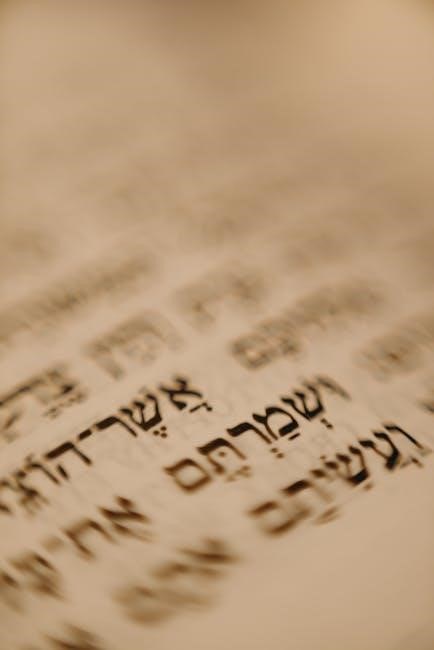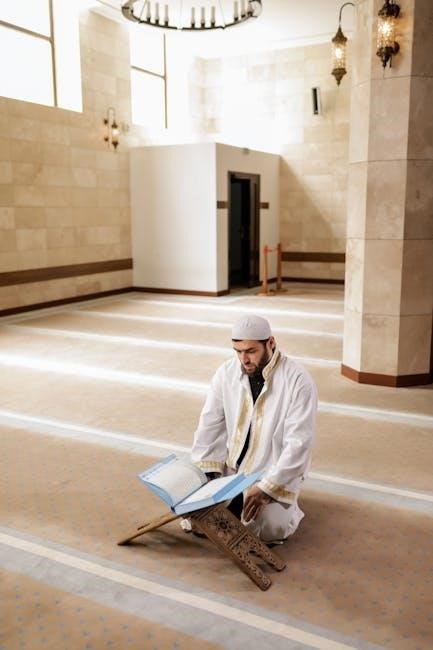
The Prince Hall Masonic Ritual Book is a cornerstone of African American fraternalism, offering insights into the traditions and teachings of Prince Hall Freemasonry. Available in PDF format, it preserves the rich heritage and symbolic teachings of this historic fraternal order, making it accessible for modern scholars and members alike.
Overview of the Prince Hall Masonic Tradition
The Prince Hall Masonic Tradition is the oldest and most recognized fraternal organization founded by African Americans, tracing its origins to the 18th century. Rooted in the principles of justice, equality, and brotherly love, it emphasizes moral and spiritual growth, fostering unity and empowerment within the community. The tradition is deeply connected to African American history, serving as a platform for social progress and mutual aid. It incorporates elements of African, European, and Indigenous American cultural influences, creating a unique and enriching fraternal experience. The Prince Hall Masonic Ritual Book, often available in PDF format, is a key resource, providing teachings, rituals, and symbolism that guide members in their journey of self-improvement and service to others.
Significance of the Ritual Book in Prince Hall Freemasonry
The Prince Hall Masonic Ritual Book holds profound significance as a foundational text guiding members through rituals, moral teachings, and spiritual growth. It serves as a blueprint for lodge ceremonies, preserving the tradition’s heritage and ensuring continuity. The book is not merely a procedural guide but a repository of symbolic wisdom, fostering unity and understanding among members. Its availability in PDF format has made it more accessible, allowing modern Masons to study and reflect on its teachings; The Ritual Book is a cornerstone of Prince Hall Freemasonry, embodying its values of brotherhood, justice, and self-improvement, while connecting members to their rich historical and cultural legacy.

History and Evolution of the Prince Hall Ritual
The Prince Hall Ritual traces its origins to the 18th century, evolving from early Masonic traditions and adapting to the unique experiences of African American Freemasons, with key figures like Prince Hall shaping its development over time.
Origins of Prince Hall Freemasonry
Prince Hall Freemasonry traces its origins to 1775 when Prince Hall, a free African American, and fourteen others were initiated into Freemasonry by a British Military Lodge. After the American Revolution, they faced exclusion from mainstream Masonry, leading Hall to establish African Lodge No. 1 in 1784. The lodge operated under a warrant from the Grand Lodge of England until 1799. The Prince Hall Masonic Ritual Book draws its earliest influences from the British “Moderns” tradition, blending Masonic teachings with the unique experiences of African Americans. This foundational text has since evolved, preserving the legacy of Prince Hall and his vision of brotherhood and equality.
Key Figures in the Development of the Ritual
Prince Hall Freemasonry’s ritual development owes much to influential figures like Prince Hall himself, who laid the foundation for the tradition. Moses Wolcott Redding is notable for compiling early versions of the ritual, while Anthony Nizzardini later refined it, creating the “Ecci Orienti,” or “Black Book.” These individuals played crucial roles in shaping the teachings and practices reflected in the Prince Hall Masonic Ritual Book. Their contributions ensured the preservation of Masonic principles tailored to the African American experience, blending universal truths with cultural relevance. Their work remains central to the ritual’s enduring legacy and its digital availability, such as in PDF formats, ensuring accessibility for future generations.
Evolution of the Ritual Over Time
The Prince Hall Masonic Ritual has undergone significant evolution, reflecting the adaptation of universal Masonic principles to the African American experience. Early versions were influenced by Northern Jurisdiction rituals, with later modifications incorporating cultural and historical contexts relevant to African American communities. Key figures, such as Moses Wolcott Redding and Anthony Nizzardini, played pivotal roles in refining the ritual, ensuring its authenticity and relevance. Over time, the ritual has been updated to address contemporary issues while preserving its core teachings. The integration of symbolic meanings and moral lessons has remained consistent, fostering a deep sense of unity and purpose among members. This evolution is evident in modern digital versions, such as the PDF format, which ensures the ritual’s accessibility and continuity for future generations.

Structure and Content of the Ritual Book
The Prince Hall Masonic Ritual Book is organized into degrees, each containing symbolic teachings and moral lessons. It guides members through Masonic principles and ethical development.
Organization of the Ritual Degrees
The Prince Hall Masonic Ritual Book is structured into three primary degrees: Entered Apprentice, Fellowcraft, and Master Mason. Each degree builds upon the last, conveying moral and symbolic lessons. The ritual is divided into lectures, ceremonies, and obligations, ensuring a progressive understanding of Masonic principles. Officers play key roles in delivering these teachings, while members are expected to memorize and internalize the content. The PDF format preserves this structured approach, maintaining the integrity of the original teachings. This organization ensures that the ritual remains accessible and consistent, guiding members through their Masonic journey with clarity and purpose. The degrees are designed to foster personal growth and fraternal unity.
Symbolism and Teachings in the Ritual
The Prince Hall Masonic Ritual Book is rich in symbolism, employing tools like the square, compasses, and All-Seeing Eye to convey moral and philosophical truths. These symbols, deeply rooted in Masonic tradition, guide members toward self-improvement and service to humanity. The ritual emphasizes unity, equality, and justice, reflecting the historical struggles and aspirations of African American communities. Teachings are delivered through allegorical stories and lectures, encouraging introspection and ethical living. The PDF version maintains the visual and textual integrity of these symbols, ensuring their timeless wisdom remains accessible to modern practitioners. This blend of symbolism and instruction fosters a profound understanding of Masonic principles and their application in daily life.

Prince Hall Masonic Ritual and Its Place in African American History
The Prince Hall Masonic Ritual holds profound significance in African American history, fostering unity and resilience through fraternal bonds and symbolic teachings that empowered communities.
The Role of Prince Hall Freemasonry in African American Fraternalism
Prince Hall Freemasonry has historically served as a vital institution in African American communities, fostering unity, resilience, and empowerment. Established by Prince Hall in 1775, it provided a framework for brotherhood and mutual support, particularly during times of racial segregation and oppression. The ritual book, often in PDF format, has been a cornerstone for preserving the teachings and traditions of this fraternal order. It emphasizes moral development, community service, and the preservation of African American cultural heritage. The rituals and degrees outlined in the book have played a central role in shaping the identity and purpose of Prince Hall Masons, ensuring their legacy endures as a symbol of strength and solidarity.

Modern Availability and Digital Versions
The Prince Hall Masonic Ritual Book is widely available in PDF format, ensuring accessibility for modern practitioners and preserving its historical significance for future generations.
Prince Hall Ritual Book in PDF Format
The Prince Hall Masonic Ritual Book is readily available in PDF format, offering a convenient and accessible way to explore its teachings and traditions. This digital version ensures that the rich history and symbolic lessons of Prince Hall Freemasonry are preserved for future generations. The PDF format allows for easy sharing and study, making it a valuable resource for both members and researchers. Many online platforms, including Masonic educational websites and digital archives, provide access to this document. Its availability in PDF has played a crucial role in spreading the principles of Prince Hall Freemasonry, ensuring its legacy endures in the digital age.
Comparisons with Other Masonic Rituals
Prince Hall Masonic rituals share core values with mainstream Freemasonry but differ in unique traditions and symbolism, reflecting its distinct cultural and historical African American context.
Differences Between Prince Hall and Mainstream Masonic Rituals
The Prince Hall Masonic rituals differ from mainstream Masonic rituals in their historical roots and cultural emphasis. While both traditions share foundational Masonic principles, Prince Hall rituals are deeply intertwined with African American history and experiences. The Prince Hall Ritual Book reflects this unique heritage, incorporating specific ceremonies and symbols that highlight the struggle for equality and justice. Unlike mainstream rituals, which often draw from European traditions, Prince Hall rituals emphasize community empowerment and the legacy of African American fraternalism. Additionally, the Prince Hall Ritual Book includes distinct teachings and practices that set it apart from other Masonic traditions, making it a vital part of African American cultural and fraternal identity.
The Prince Hall Masonic Ritual Book stands as a testament to the enduring legacy of African American fraternalism, preserving traditions and teachings for future generations in PDF formats.
The Enduring Legacy of the Prince Hall Masonic Ritual Book
The Prince Hall Masonic Ritual Book remains a vital artifact in African American fraternal history, preserving the traditions and philosophical teachings of Prince Hall Freemasonry. Its availability in PDF format ensures accessibility for modern scholars and members, fostering education and cultural preservation. The ritual book not only serves as a guide for Masonic practices but also as a historical document, highlighting the resilience and contributions of African American communities. By maintaining its relevance, the Prince Hall Ritual Book continues to inspire and unite, solidifying its legacy as a cornerstone of fraternalism and heritage.